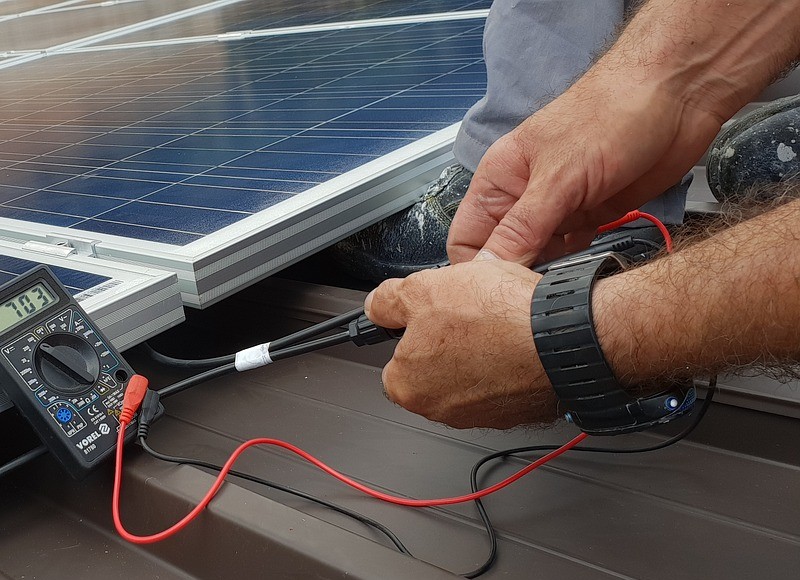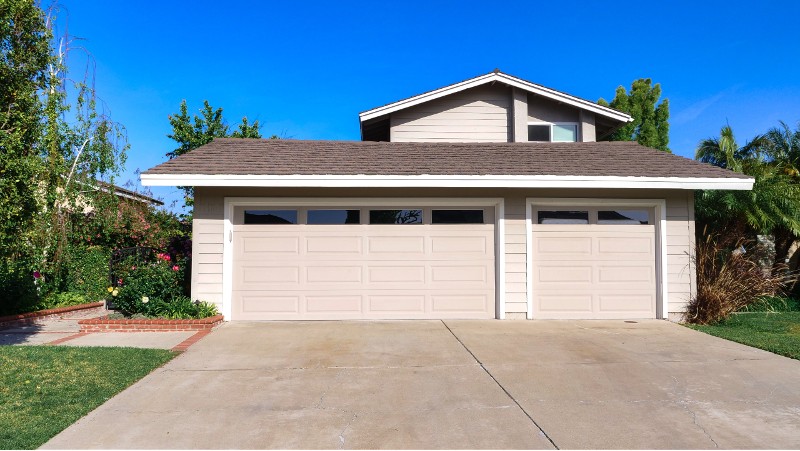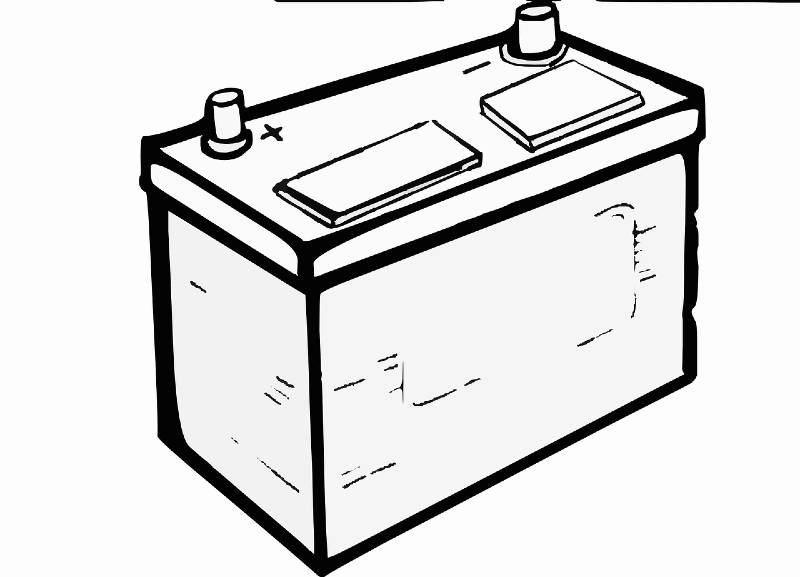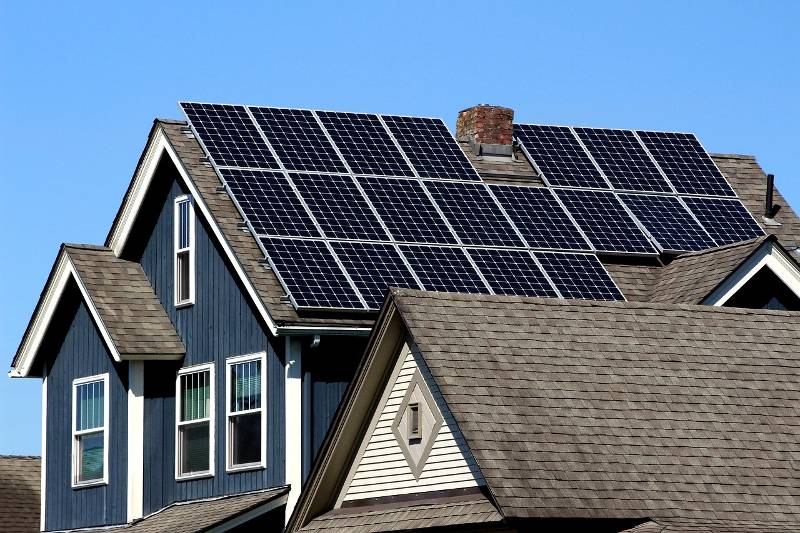The 100 watt solar panels can run small appliances and electronics, such as phone chargers, lights, fans, and more.
This makes it a great option for powering a small shed, RV, or cabin, or even for camping and outdoor adventures.
But what exactly can the 100 Watt solar panels run?
Well, if you are looking for a detailed answer, then you are just in the right place.
In this article, you’ll discover how much energy can the 100W solar panels produce and what you can run with it.
You’ll also learn what size battery, charge controller, and inverter you will need to effectively use 100W solar panels and how much these components will cost.
So if you’re ready to learn more about 100 Watt solar panels and how you can use them to power your home or outdoor adventures, keep reading!
Key Takeaways
- The amount of power your 100W solar panels can produce depends on the amount of peak sun hours your area gets.
- Peak sun hours are the number of hours per day that solar radiation averages at 1000 W/m2.
- The 100W solar panels will produce about 400-500 watts of power per day.
- The 100W solar panels will run small appliances like LEDs, fans, phone chargers, laptops, wifi routers, and TVs.
- The 100W solar panels produce about 5.5A per peak sun hour or 25A per day
- Batteries have something called depth of discharge (DoD) and it’s the amount of energy you can safely drain from the battery without damaging it.
- The 100W solar panels will need a 50Ah Lithium Ion battery or a 100Ah Lead Acid battery.
- You need a charge controller to regulate the amount of power flowing into and out of your battery, as well as to prevent overcharging.
- The 100W solar panels will need a 10A solar charger
- Solar panels output DC current, so if you want to power AC appliances, you will need a solar inverter to convert the DC power into AC.
- A 100W panel will need a 200W inverter.
- You can connect multiple 100 watt solar panels together.
How Much Power Does A 100 Watt Solar Panel Produce?
Before getting into what can a 100 watt panel power, first, we need to understand what we mean by 100 watts.
Solar panels are rated in watts and it’s the amount of energy that the panel can generate for every peak sun hour it receives.
In other words, it’s how efficient the panel is at converting sunlight into electricity.
Peak sun hours are the number of hours per day when solar radiation averages 1000 W/m².
Why exactly 1000 W²?
Because that’s the level of solar radiance that the solar panels are tested and rated at the laboratory (Standard Test Conditions.)
They get a panel and shine an artificial 1,000 watts of sunlight on it for every square meter and see how much electricity it produces.
If it produced 100W of electricity, then that’s a 100W solar panel.
So, to get the power output of 100W solar panel, we need to multiply 100 watts by the number of peak sun hours it receives.
Energy Output = Solar Panel Wattage x Peak Sun Hours
The number of peak sun hours you get each day is typically dependent on where you live, with locations near the equator typically receiving more solar radiation than those that are further away.
But on average, you can expect 4-5 hours of peak sun hours per day.
Therefore, if you have a 100-watt solar panel in an area with 4 peak sun hours per day, it will generate around 400 watts of power each day.
What Can a 100 Watt Solar Panel Power?
Ok, so now we now that a 100-watt solar panel can generate around 400 watts of energy on a typical day.
Let’s ask the real question, what can I run with 400W?
These equations will give you an idea of how much power each appliance in your home needs:
Appliance Power Usage (Wh) = Appliance Power Rating (W) x Number of Hours Used (h)
Number of Hours (h) = Solar Panel Total Power Output (W) / Appliance Power Rating (W)
Let’s test this out with an example.
Let’s say I have a 35W ceiling fan, how many hours can your 100 watt solar panel run it?
Based on the equation above, we know that our 100 watt solar panel will generate 400W per day.
And we know that our ceiling fan requires 35W per hour.
So to find out how many hours the fan can be run, we need to divide 400W/35W, which gives us about 11.5 hours.
Now, there is a problem with this scenario.
We have not taken into account the hourly solar panel output.
We assumed that we just have 400W of power but in reality, this power is being generated throughout the day at a fluctuating rate.
One hour we generate 20W electricity and the next 60W, and the third 40W.
Your fan requires 35W per hour and if the solar panel can’t provide that at any point, the fan simply will stop working.
Also, this means that fan won’t work at night because the solar panel won’t be generating any energy.
Dammit!
If only there was a way to store energy, so you could provide your appliance with a constant, uninterrupted flow of power.
Luckily, there is!
You just need a battery storage system and in the next section, I’ll go through what size battery you need for a 100 watt solar panel.
But first, I made you a list of a few common appliances that a 100 watt solar panel can run:
| Appliance | Wattage | Run Time |
| LED Lights | 20W | 20 hours |
| Wifi Router | 10W | 40 hours |
| Ceiling Fan | 35W | 11.5 hours |
| Phone Charger | 5W | 80 hours |
| Laptop Charger | ||
| TV | 100W | 4 hours |
| Satellite Dish | 35W | |
| LED Lights + Ceiling Fan + Phone Charger | 60W | 6.5 hours |
| LED Lights + Wifi Router + Laptop | 100W | 4 hours |
| LED Lights + Wifi Router + TV screen | 130W | 3 hours |
| LED Lights + Satellite Dish + TV | 155W | 2.5 hours |
What Size Battery for a 100 Watt Solar Panel?
Batteries are rated in amp-hours (Ah) and it’s how many amps can a battery provide for a certain number of hours.
For example, a 100Ah battery can provide 10A of power for 10 hours or 5A of power for 20 hours before it’s completely drained.
To correctly size our solar battery system, we need to know how many amps the 100-watt solar panel is able to produce.
Here is how it’s calculated:
Solar Panel Amperage = Solar Panel Wattage / Solar Panel Voltage
In peak sun hours, the operating voltage of a 100W solar panel is usually around 17V – 18V.
This means that a 100W solar panel produces approximately 5.5A per peak sun hour.
And since we get 4-5 peak sun hours per day, this translates to 22-27.5A per day.
So for a 100W solar panel, we need a 27.5Ah battery, right?
Well, not quite.
There is an extremely important factor that we need to take into account when sizing our battery, and it’s the depth of discharge (DoD.)
Depth of Discharge is how much energy you can safely draw from the battery without potentially damaging it and it’s expressed as a percentage of the total battery capacity.
For example, Lead Acid batteries have a DoD of 50%, meaning that you can only safely draw 50% of the battery capacity.
So if your battery is 100Ah, then you should cycle it between 50Ah and 100Ah to increase its lifespan.
Lithium Ion batteries, on the other hand, have a DoD of 70%, meaning that you can only use 70Ah of your 100Ah battery. In other words, you should treat your 100Ah battery as if it was a 70Ah battery and never let it discharge below 30Ah.
With that in mind, here is how to calculate the right battery size for a 100W solar panel:
Battery Size = The Amount of Energy You Want to Store / Battery DoD Rate
So if your 100W solar panel produces 27.5Ah per day and you have a lithium Ion battery with a DoD of 70%, then the battery size you need is 40Ah (27.5/70%.)
Let’s add another 20% buffer to this to make sure we account for the occasional cloudy day and the days when you don’t use 100% of your solar energy.
This means that you need a 50Ah lithium Ion battery or a 100Ah Lead Acid battery for a 100W solar panel.
What Size Charge Controller for a 100 Watt Solar Panel?
Are you familiar with the word overcharge?
Well, in simple terms, it means that a battery is being charged with too much solar electricity.
This can be very dangerous and potentially damage your battery bank, so to prevent that, we use a regulator called a charge controller.
Without getting into too much technical detail, charge controllers work by controlling the amount of energy going into the battery.
They are rated in amps and here is how to size your solar charge controller:
Charge Controller Amperage = Panel Wattage / Battery Voltage
In our case, a 100 watt solar panel connected to a 12V battery requires a charge controller that can handle at least 8.3A.
So for a 100 watt solar panel, you need a 10A charge controller.
What Size Inverter for a 100 Watt Solar Panel?
So far we have been talking about DC energy, but most of your appliances will require AC energy.
That’s where an inverter comes in.
An inverter takes the DC energy that your 100 watt photovoltaic panel produces and converts it into AC energy, which is what the majority of your appliances need.
The size of an inverter is measured by its maximum continuous power (MCP) rating – the maximum amount of power it can provide continuously.
Let’s say that you want to power a 20W LED light, a 35W ceiling fan, a 10W wifi router, and a 70W laptop – all at the same time.
This will add up to 135W, so your inverter must provide a continuous power rating of at least 135W to power all these devices at the same time.
For a 100 watt solar panel, I recommend you get a 200W solar inverter.
You won’t need more than that for all your small devices, and it ensures you have some extra power to spare.
Can You Connect Multiple 100 Watt Solar Panels Together?
You can connect multiple 100 watt solar panels together to increase the amount of energy they can produce.
For example, if you connect 3 100W solar panels together, you can get a total of 300 watts from your solar energy system.
However, it’s important to know whether you should connect your solar panels in series or in parallel.
Connecting solar panels in series will increase the voltage while keeping their amperage the same.
Connecting solar panels in parallel, on the other hand, will increase the amperage while keeping their voltage the same.
Depending on your inverter and charge controller specifications, you might need to pair them in parallel, series, or most of the time, a combination of both.
Solar Panel vs Solar Panel Kit vs Solar Generators
When you are buying a solar power system, you’ll have 3 options:
- Make Your Own 100W System: This involves buying a solar panel, charge controller, battery, and inverter separately and connecting them together. This is better suited for DIY enthusiasts who want to save money and have more control over their solar system.
- Buy a Solar Panel Kit: A 100 watt solar kit will typically come with its own photovoltaic panel, charge controller, inverter, and some kits even include batteries. This is a great way to save time and start producing solar energy immediately.
- Buy a Solar Generator: A solar generator is basically an all-in-one system that has everything you need to start generating solar energy. It is typically more expensive than building your own 100W solar system, but it is super easy to set up and 100% portable.
So, which option is better?
It depends on your needs and budget.
If budget is a top priority, you can definitely save some money by building your own 100W solar system.
You don’t have to be tech-savvy to build your own solar system, there are hundreds of step-by-step tutorials out there that can help you out.
If you just want to get started producing solar energy as quickly as possible, a 100 watt solar panel kit is the most convenient option. You just need to buy it and mount it on your roof or in a sunny spot outside to start generating renewable energy.
If you want the ultimate flexibility and portability for camping or other outdoor adventures, you’ll definitely want to invest in a 100W solar generator.
How Much Does a 100 Watt Solar Panel Cost
A 100 watt solar panel costs about $100.
A 100 watt solar panel kit costs about $200 without the battery and $400 with a 50Ah battery.
A 100 watt solar generator costs about $500.
What Are the Best 100 Watt Solar Panels?
Best Standalone Solar Panel: Rengoy 100W Monocrystalline Solar Panel
Features
- Dimensions: 41.8″L x 20.9″W x 1.4″H
- Weight: 14.1 pounds
- Type: Monocrystalline
- Efficiency: 22%
- Warranty: 25 years
Best Solar Panel Kit: ECO-WORTHY 100 Watt Solar Kit with Battery
Features
- Dimensions: 39.8″L x 20.1″W x 1.4″H
- Type: Monocrystalline
- Efficiency: 22%
- Battery: 20Ah
- Inverter: 600W
- Charge Controller: 30A
- Warranty: 1 year
Best Solar Generator: Jackery Portable Power Station Explorer 240
- Generator Dimensions: 9.05 x 5.24 x 7.87 inches
- Running Wattage: 240W
- Battery: 20Ah
- USB Ports: 2
- Ac Outlets: 1
FAQs
How Many Amps Does 100W Solar Panel Produce?
A 100W solar panel produces about 5.7 amps of current when exposed to direct sunlight.
What Is the Size of a 100 Watt Solar Panel?
A 100W solar panel is about 40 inches long and 20 inches wide and it weighs about 14 pounds.
Can You Power a Home with a 100 Watt Solar Panel?
You can’t power a home with a 100-watt solar panel alone.
100W solar panels can only power small appliances like phone chargers, lights, and small fans.
How Many 100W Solar Panels Do I Need for My House?
The average household needs 66 100 watt solar panels to produce 100% of their daily energy needs.
This can vary depending on the size of your home and how much electricity you typically use.
Can a 100 Watt Solar Panel Run a Refrigerator?
A 100 watt solar panel can run a 500W refrigerator for 3 hours, assuming a 33% duty cycle.
Can a 100 Watt Solar Panel Run an Air Conditioner?
A 100 watt solar panel can run a 500W room air conditioner for an hour and 20 minutes, assuming a 66% duty cycle.
Can a 100 Watt Solar Panel Run a Space Heater?
A 100 watt solar panel can run a 1500W space heater for about 20 minutes, assuming an 80% duty cycle.
Do 100 Watt Solar Panels Require Maintenance?
No, 100 watt solar panels do not require any kind of maintenance or upkeep to continue producing efficient energy. They are designed to be very durable and long-lasting, with minimal need for repairs or replacement over time.
How Long To Charge a 12v Battery with 100 Watt Solar Panel?
Voltage has nothing to do with charging time.
A 100 watt solar panel will charge the 12v battery at a rate of 5 amps per hour.
So to fully charge a 12V 100Ah battery, you will need 20 hours of peak sunlight or 4-5 days.
Conclusion
A 100W solar panel can power small appliances and electronics, but it won’t be able to run larger appliances like refrigerators, air conditioners, or space heaters.
If you’re looking for a 100 watt solar panel that can power a whole house or provide energy for off-grid living, you’ll need to invest in a larger solar panel kit or solar generator.






